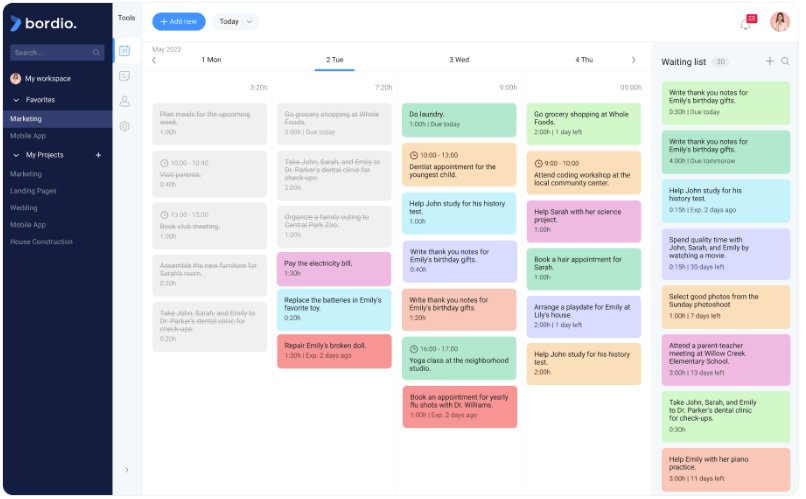Is it better to be spontaneous or to be a meticulous planner? Historically, some have argued that embracing spontaneity allows individuals to seize every moment, making unexpected choices that enrich their lives. On the other hand, many believe that careful planning has been and remains the cornerstone of achieving success. How might your life change if you leaned more into planning?
Stress reduction
One of the most significant benefits of planning is stress reduction. Living with unexpected events and deadlines can cause considerable stress and discomfort. In contrast, planning provides a clear structure and path to follow, reducing the unknown and eliminating the need for last-minute decisions.
A planner prepared in a task tracker helps you avoid the overwhelm and anxiety associated with balancing multiple tasks and commitments. It lets you realize you have more power over your life than it may seem at first glance. Also, when you have a defined strategy in place, you can change it to handle the unexpected better.

When planning, you can set aside time for rest and self-care. When you have time to relax, it’s easier to de-stress and appreciate the present without thinking about the future. Planning, by helping to control spending and manage your budget, can help you cope with financial stress. With proper preparation, you can reduce debt and improve your financial situation. Planning is an effective stress management strategy that can make your life more balanced and fulfilling.
Increased Productivity
Planning can significantly increase productivity by helping you allocate your time and resources effectively. Prioritizing and maximizing resources to achieve objectives is a crucial time management idea.
You can view the large picture, decide which activities are most crucial, and demand your focus by making a clear, structured plan. You may do each work more quickly and effectively by concentrating on only one at a time, eventually boosting your productivity.
Planning also helps you in overcoming procrastination. You have a detailed action plan outlining the next steps. This can help you avoid distractions and maintain your attention on your activities.
Healthy Lifestyle
Making plans could be required to maintain and improve your health and well-being. You may create healthy habits in your life and make sure you constantly follow them by using this powerful tool. Planning is the first step to a healthy diet. Producing a weekly diet plan will help you eat a varied and balanced diet. Planning allows you to select wholesome foods and consider all the macro- and micronutrients your body needs. Additionally, it aids in preventing overeating and impulsive purchasing.
Regular exercise is critical to physical health. Making physical activity a routine will be easier with little planning. For a well-rounded approach to fitness, it will also enable you to consider various routines (such as strength training, cardio, and stretching). Healthy sleep and rest are critical for restoring energy, boosting immunity, and maintaining mental health. Planning includes establishing a regular sleep schedule and making time for relaxation and recovery throughout the day.
This may entail scheduling some time for self-care activities such as meditation, reading, journaling, or writing. Making time for this lowers stress and promotes emotional well-being. In this way, planning helps to reinforce and maintain a healthy lifestyle by providing structure and direction for implementing and maintaining healthy habits.
Goal Achievement

Planning is essential to reaching your objectives, whether they are financial, professional, or personal. Organizing your resources and activities should guide your efforts toward predetermined goals.
Planning first aids in goal identification and strategic goal-achieving. You may create a clear route to your final objective by breaking your major ambitions into smaller, doable milestones. It also enables you to predict how much time and money each goal will take to complete.
Third, planning provides flexibility. You may encounter unforeseen obstacles or changes in circumstances while executing your plans. You may more readily adapt to new opportunities and tweak your plans to consider the changes if you have a plan.
Planning offers the organization, focus, and flexibility essential for achieving goals successfully. Planning can help you use your resources wisely and keep your attention on the task at hand, which could speed up your progress or possibly prevent you from reaching your objectives.
Improving work-life balance
Planning is a fundamental tool for improving work-life balance. In the modern person’s life, where commitments at work and home often conflict, quality planning can help manage this balance and reduce stress.
First, planning allows you to prioritize and set boundaries between your professional and personal life. By outlining your tasks and commitments, you can ensure that your time and effort are evenly distributed. This will help you avoid overworking and underestimating individual needs and interests.
Second, planning increases productivity and efficiency. Focus on what’s important and reduce time spent on unimportant chores by organizing and prioritizing your duties. This gives you more time for your personal life and lets you explore your interests.
Third, scheduling reduces stress and guards against overwork. By scheduling time for rest, you can replenish your energy and prevent burnout.
Increased self-confidence

Planning might be beneficial for increasing your self-assurance and productivity and helping you accomplish your goals. You may improve your control over your life and increase your confidence and self-esteem by actively affecting your destiny.
Planning first aids in improving your organization. Uncertainty-related stress and anxiety are lessened when you know what to do, when, and how to accomplish it. You thus feel more specific in your choices and behaviors.
Second, planning results in more performance. Your confidence in yourself and your talents will grow as you watch your plans come to fruition. This raises one’s confidence and sense of self-worth.
Third, planning aids in goal definition and achievement. Setting and attaining objectives, whether short-term or long-term, personal or professional, improves your self-worth and dignity.
Last but not least, planning enhances self-esteem and self-confidence, enabling you to act and make decisions more assuredly. It increases your sense of personal competence and self-efficacy by providing you with the tools to go beyond challenges and accomplish your objectives.



